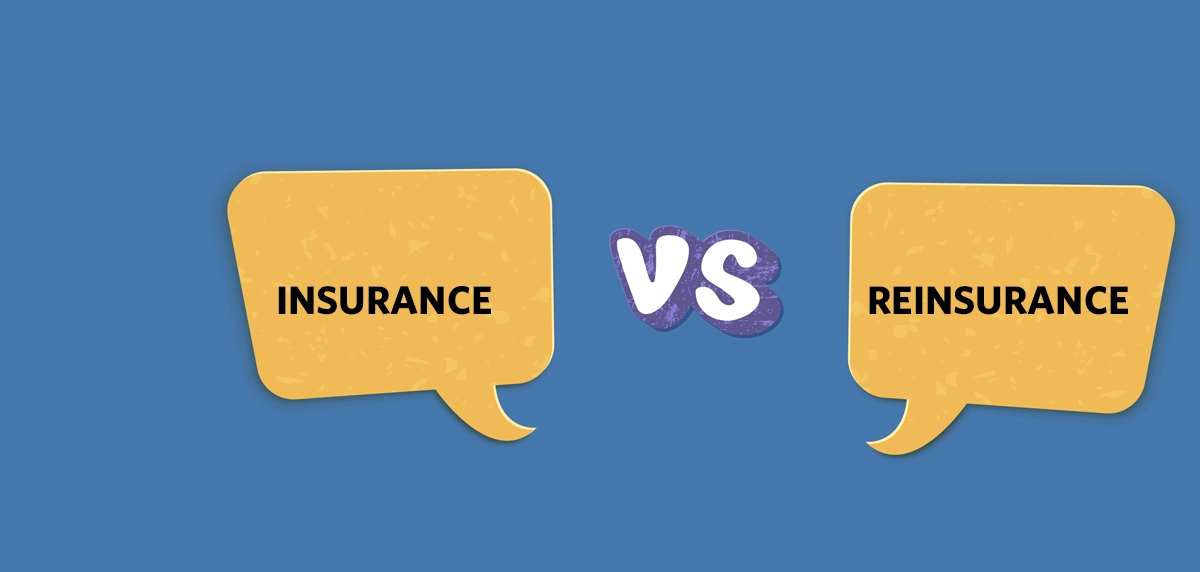If you have bought a life insurance policy or are planning to buy one, you may be aware of how the process works. The insurance company agrees to pay financial compensation in case an unforeseen event causes harm or damage to the insured individual. In return, you pay a life insurance premium to the insurer.
Have you ever wondered how the insurance company protects itself from unforeseen situations? It does so by way of reinsurance.
Even though both work in the same manner, there are some major differences between insurance and reinsurance. Keep reading to understand each in detail, as well as the differences between them.
What is Insurance?
This is the type of insurance you are more likely to be familiar with. An insurance contract refers to an agreement between two parties – the insurance company and the insured. The insurance company provides financial protection to the insured against unpredictable events that can cause monetary consequences. The insured pays premiums to ensure this coverage stays active. Insurance is broadly categorised into two - life insurance and general insurance.
Each has various sub-categories. There are many types of life insurance plans, such as term insurance, whole life insurance, Unit-linked Life Insurance (which can act as investment plans), and so on. General insurance can come in the form of health insurance, motor insurance, travel insurance, home insurance, and so on.
If you are a taxpayer, you can reduce your tax outgo by opting for insurance policies. Health insurance can provide tax benefits under Section 80D while life insurance tax benefits can be availed under Section 80C of the Income Tax Act. **
What is Reinsurance?
It refers to a process wherein an insurance company transfers its risks to another party, called the reinsurer. It is a way for an insurance company to mitigate the financial consequences of an unfortunate event that may affect them.
Being in the insurance industry can come with its set of financial risks. There is no saying when a major unpredictable event will occur, leading to a heavy financial setback for an insurer. By tying up with a reinsurance company, the insurer can ensure the entire burden of the financial setback does not fall solely on their shoulders. The reinsurer can bear some of the setback, allowing the insurer to remain financially stable.
Reinsurance can be of various types:
Treaty Reinsurance
Here, the insurance company transfers the risk of a particular group or category of policies to a reinsurer. This covers all policies that fall under the agreed category; it can be motor insurance, health insurance, fire insurance, etc.
Facultative Reinsurance
This type of reinsurance works on a more specific basis. Here, the insurance company transfers the risk related to a single policy or a few selected policies to the reinsurer.
Examples of Insurance and Reinsurance
To better understand the difference between insurance and reinsurance, let’s look at an example for each.
Insurance (life insurance):
Jayant decides to buy a life insurance policy from XYZ Insurance Company Ltd., insuring his life against unfortunate events. He chooses his spouse, Naina, as the nominee of the plan. If an unforeseen event leads to Jayant’s demise, XYZ Insurance Company will pay Naina the sum assured. This will help Naina take care of the financial consequences of Jayant’s demise. Jayant can also rest assured that his loved ones will not suffer financial hardship in his absence.
Reinsurance:
Let’s assume PQR Insurance sells a policy that covers a large shopping mall against fire damage. The total sum insured is ₹100 crore. This can be a big risk for PQR Insurance. In case a major fire breaks out, PQR would have to pay the entire ₹100 crore, which could seriously impact the company’s finances.
To reduce this risk, PQR Insurance enters into a reinsurance agreement with ABC Reinsurance Company. As per the contract, PQR agrees to cover 50% of the risk.
Now, if a fire causes ₹80 crore in damages, the financial coverage will be as follows:
- PQR Insurance pays ₹40 crore.
- ABC Reinsurance pays the remaining ₹40 crore.
Thus, reinsurance allows PQR to reduce its financial burden and it can continue its smooth operations even after a major claim.
Key Differences Between Insurance and Reinsurance
Now that you have a clear idea of how each works, let’s note key points of difference between insurance and reinsurance:
Parameter
| Insurance
| Reinsurance
|
Transfer of Risk
| The financial risk is transferred from an individual to the insurance company.
| The risk is transferred from an insurance company to a reinsurance company.
|
Purpose of the policy
| An insurance policy is designed to provide financial protection to individuals and businesses against unforeseen losses.
| A reinsurance contract aims to financially protect insurers in case of a large or catastrophic loss.
|
Premium Pricing
| The cost of an insurance policy is comparatively lower than that of a reinsurance plan.
The individual/business must pay the premium to the insurer at the agreed time.
| As the risk is covered on a large scale in reinsurance, its premiums tend to be considerably high.
The insurer must pay the premium to the reinsurance company at an agreed time.
|
Customer Base
| Individuals or businesses form the customer base of an insurance company.
| Other insurance companies are the target customers for a reinsurer.
|
Types and Categories
| Insurance is broadly categorised into life and general insurance.
These two come with further sub-categories. You can opt for term life insurance, whole life insurance, or life insurance that can also act as investment plans. You can even add a life insurance rider to your plan to make it more beneficial.
General insurance can be categorised into health insurance, motor insurance, home insurance, and so on.
| Reinsurance can be of two types: treaty reinsurance and facultative reinsurance.
|
In India, the insurance as well as the reinsurance market is regulated by IRDAI (Insurance Regulatory and Development Authority of India). IRDAI has a separate department to deal with the various aspects of the reinsurance industry in the country.
Having an insurance policy can play a great role in mitigating the financial consequences of an unfortunate event. An insurance company can take care of an individual’s losses in the face of a loss-inducing situation. However, when times take such a turn that the insurance company itself is facing a huge loss, reinsurance can step in. Knowing the difference between insurance and reinsurance can help you make the right decisions when securing your future and that of your loved ones.
** Tax exemptions are as per applicable tax laws from time to time.
























